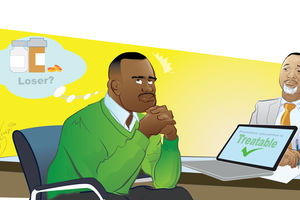
Lies grow bigger the longer the truth is hidden, leading to greater consequences once revealed.
Joshua lost his erections after his wife confessed to having had sex with his best friend when they travelled for a funeral last year.
“I do not know whether to blame the church, my wife or myself for this,” Joshua said when he came to the Sexology Clinic, “I was better off not knowing, now see what I am going through.”
Trouble started when Joshua and his wife, Mildred, went for a couples’ church retreat. The retreat was meant to build marital relationships. The facilitator had a way of stimulating couples to tell each other the truth about themselves as a way of strengthening their trust.
In the heat of the moment Mildred threw the bombshell. She confessed how she had sex outside marriage and how she felt guilty after that. Joshua walked out of the retreat. That was eight months ago.
He forgave Mildred after a lot of soul searching but unfortunately his body is not reacting sexually towards Mildred. He cannot erect.
“We have not had sex in all those months, I do not feel like it, and the erection is not there anyway,” he said, his gaze fixed on the horizon. He was a traumatised man.
Well, the question is whether your sex partner should know the truth about your life. Research shows the greatest irony of life: that the person you love the most is the one you lie to the most.
The lie may not be sex related, sometimes it is just the small things in life. Other times it is real big things, e.g. people lie about children they have had outside marriage.
People in love lie to each other because they weigh the value of the truth versus the health of the relationship. Many times, they conclude that the relationship is more important than the truth. As such 90 percent of happy relationships thrive on bits and pieces of lies day by day.
The opposite of this paradox would be to say the truth and risk abandonment. Even if you are not abandoned, truth can land you in serious conflict and the marriage may not be peaceful thereafter.
Even more important is that people want to maintain trust and to project an image that enhances intimacy. It is for this reason that Joshua was not sure who to blame: the church that made truth come out, the wife who said the truth, or himself for creating a vulnerable situation where the truth came out.
Many couples who come to the Sexology clinic say that they do not know if their partners are faithful or if they harbour other lies. They add that whatever the case, they are happy not knowing. Many a time, people blame the man or woman who goes searching for the truth, e.g. by peeping into their partner’s phone messages. This is seen as looking for trouble unnecessarily. The belief here is that ignorance is bliss.
“Should we crucify Mildred for telling you the truth?” I asked Jushua absent mindedly. He remained quiet and expressionless, most likely as conflicted as I was in these matters.
Referring back to research studies on this subject, there are situations that demand that you reveal the truth. There are truths that will come at some point.
You cannot, for example, hide children, wives, or husbands you have had in the past or that you continue to have. Confessing the truth yourself gives leverage to put it in the best way possible that builds the relationship than if the truth came through a third party.
Another thing to be aware of is that lying is a difficult affair. You are likely to keep contradicting yourself. This makes your partner raise his or her antennas and they are likely to unearth the truth themselves. This can badly erode the trust that they have in you. You are safer revealing the truth yourself.
“I cannot say that I am an angel in these matters. I have lied severally,” Joshua said, his voice trembling, “the last big lie I had is a month ago when I came home at 2 am after hanging out with a woman I was flirting around with. I told Mildred that we had an office party that ended late and she believed me.”
To reveal the truth or not is a difficult ethical issue in relationships. It is known that love alone does not maintain a relationship and that relationship management skills are supreme. Whether this includes knowing when to lie and when to say the truth is the moral question. It may also mean accepting lies for the bigger gains of a blissful relationship.
“Well, I am not sure whether coming to you has helped me,” Joshua said throwing his hands in the air, “You have only made me feel guilty about the lies I have told Mildred before.”
“We can do therapy for both of you to heal from the damage you have both suffered as a result of this unfortunate situation,” I told Joshua.
“I am sure at the end of it you will both know how best to handle truth and lies in your relationship going forward.” He agreed.









